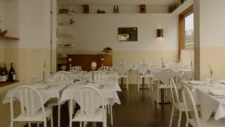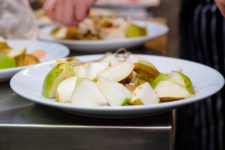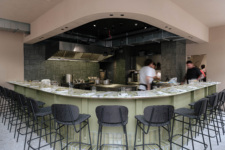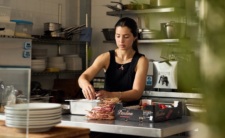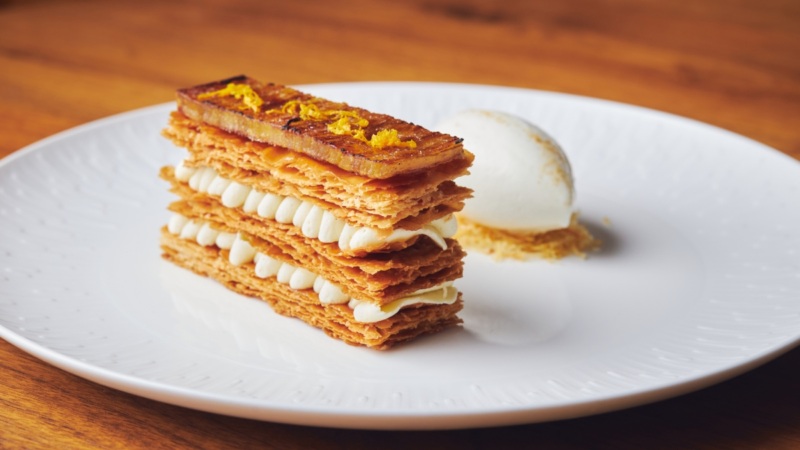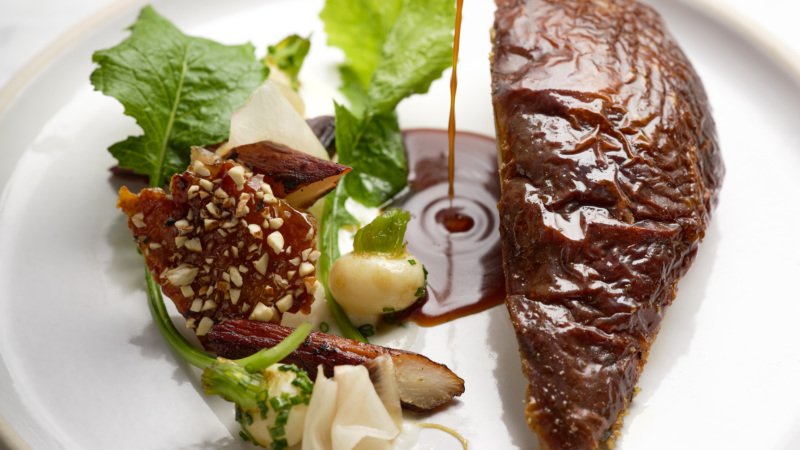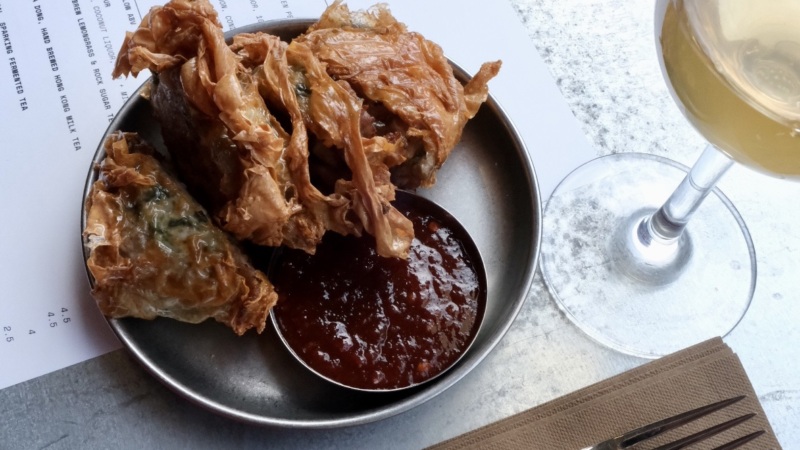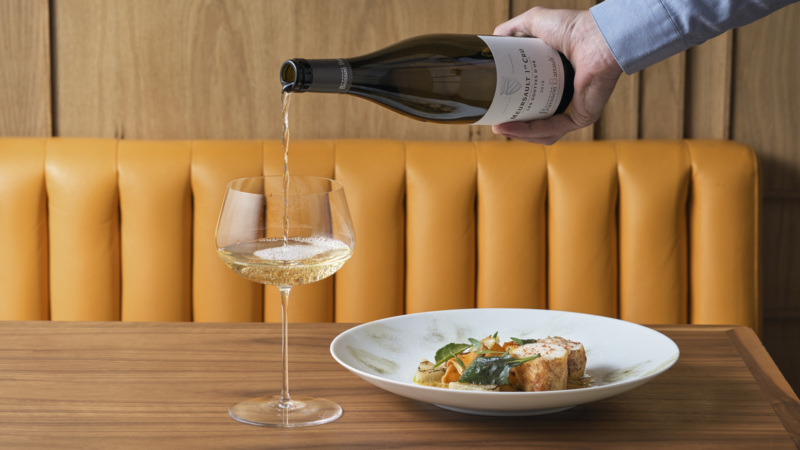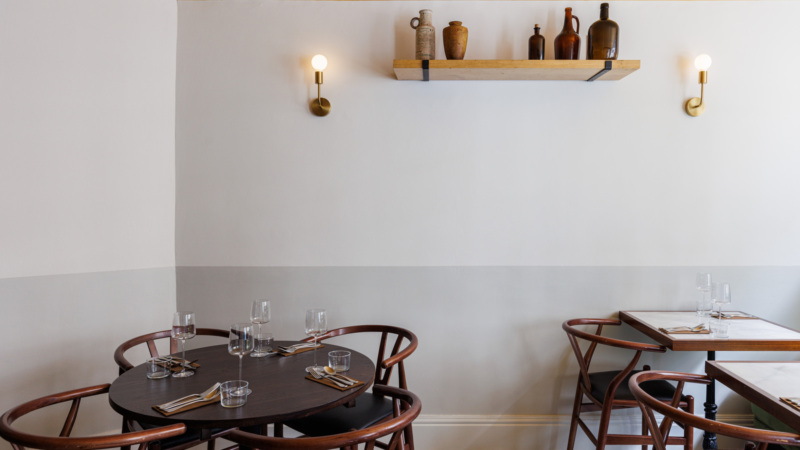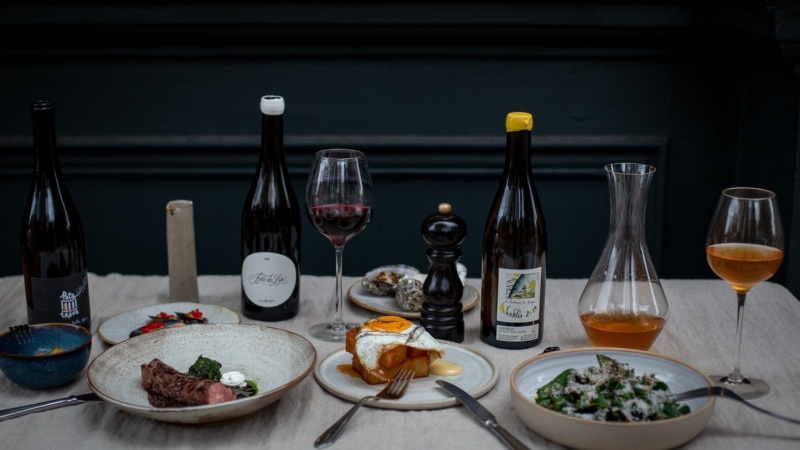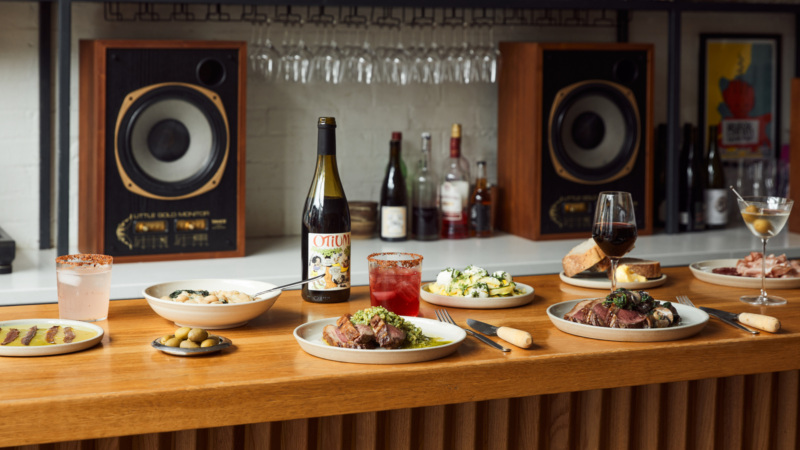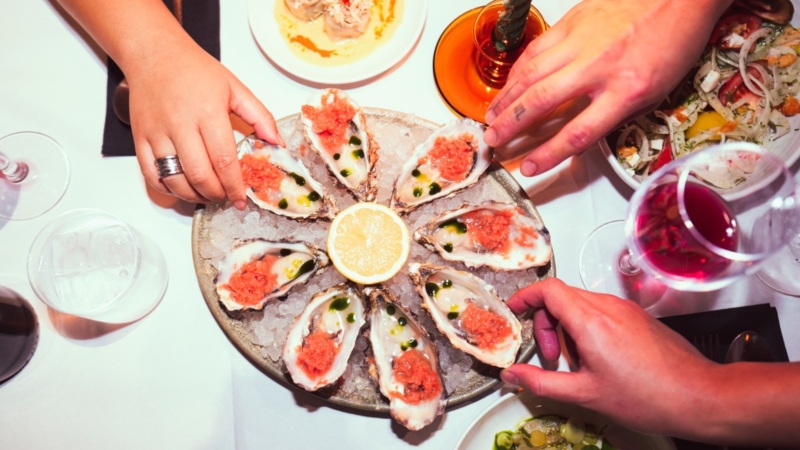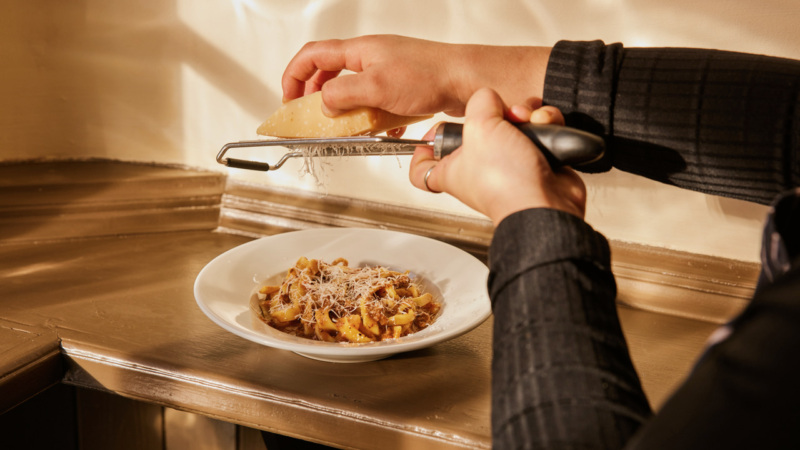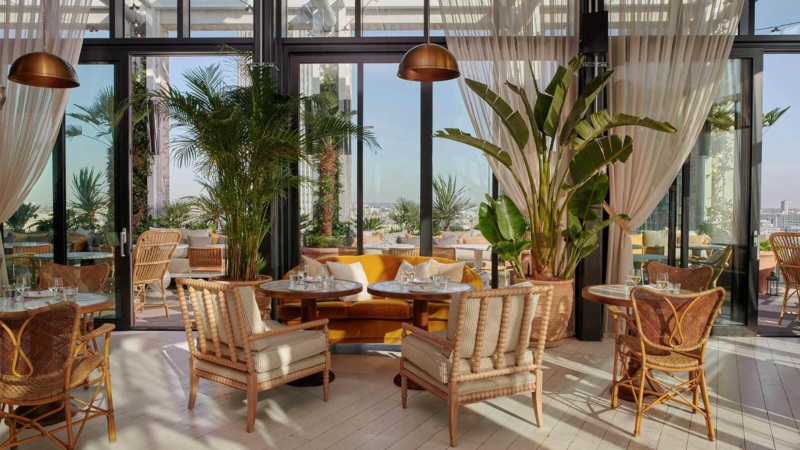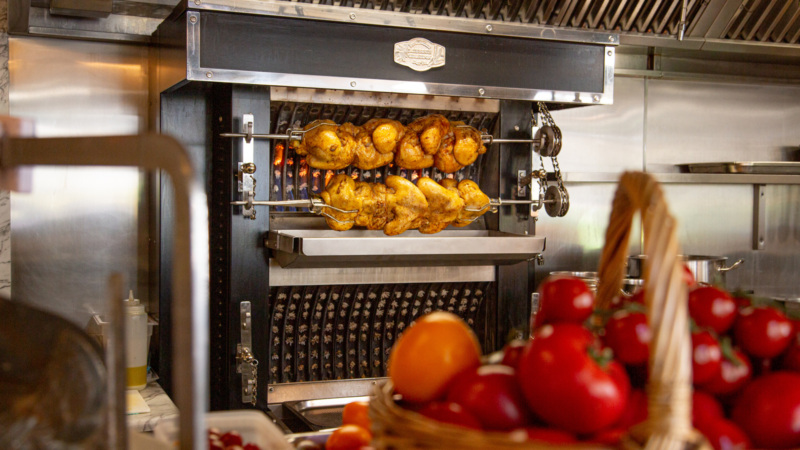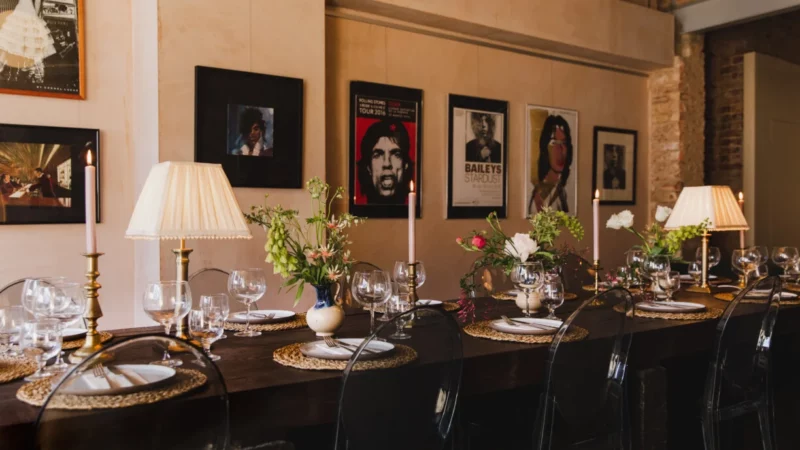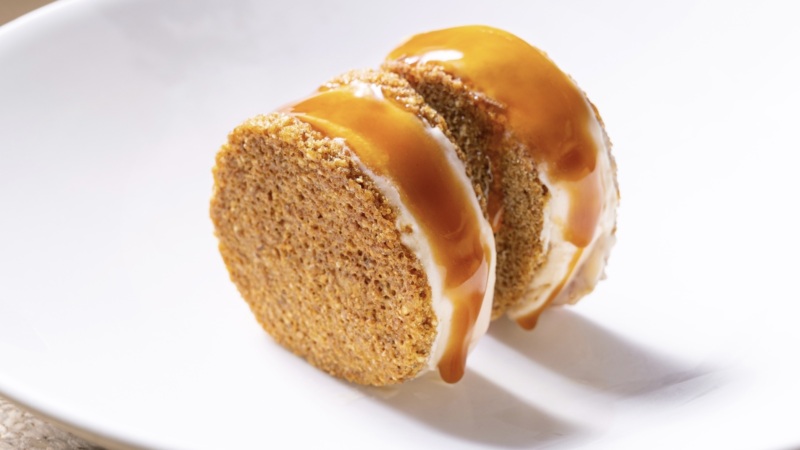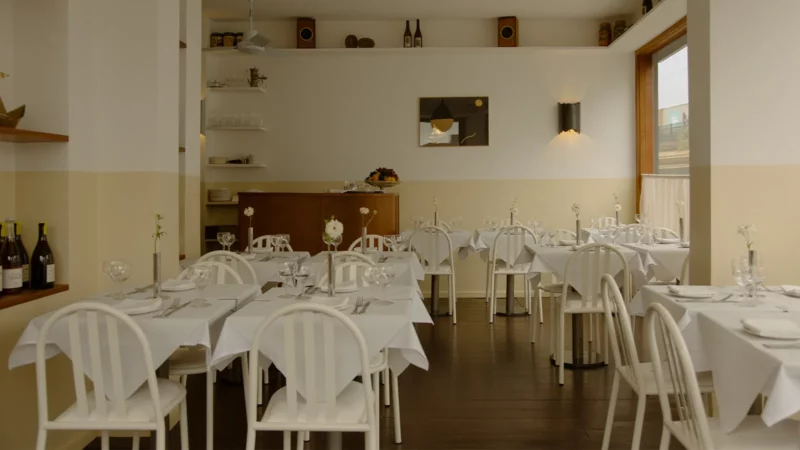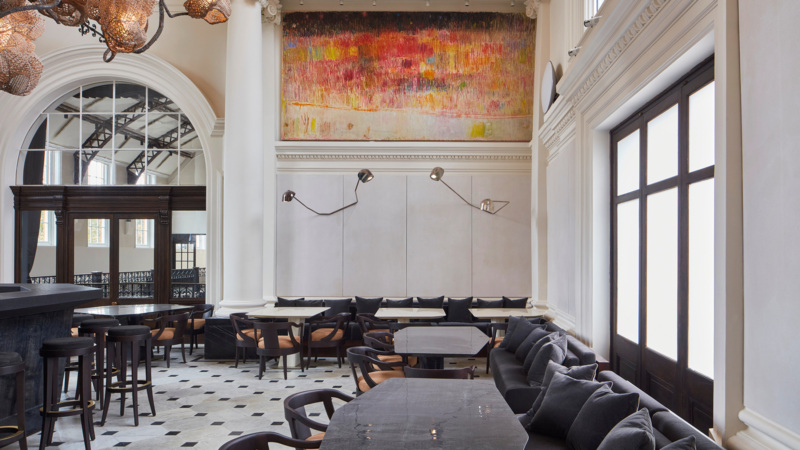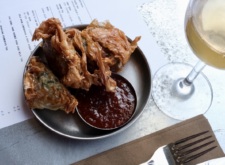
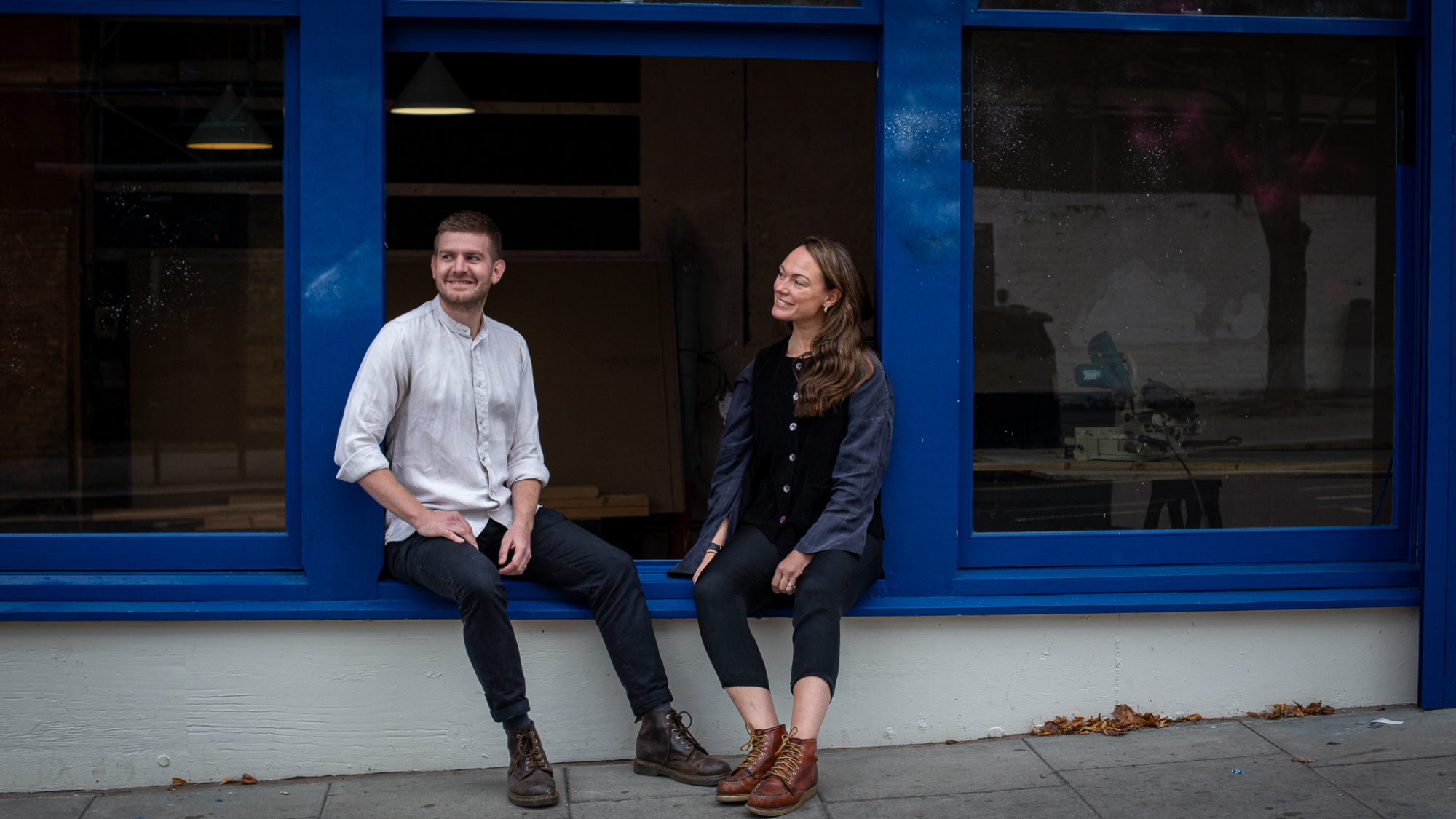
How Charlie Sims and Honey Spencer Built Sune, Their Dream Restaurant in Hackney
Husband-and-wife team Charlie Sims and Honey Spencer between them have a combined 35 years’ experience of working in restaurants all over the world. Thirty-five years of reading, learning, observing, feeling, eating, drinking, and taking notes; taking notes for the day they’d finally open their own place. That place is Sune, which opened late last year at the foot of Broadway Market in Hackney.
Sune’s DNA holds traces of all the places Sims and Spencer ever worked. For Sims, that was locally and globally influential restaurants including Jamie Oliver’s Fifteen, Brunswick House, Lyle’s, Mãos, Brawn and arguably the most influential of them all – Noma in Copenhagen, where he spent a whole five years. Spencer is probably the better known of the two, in London at least, for her wine consultancy work at Osip, Akoko, Native, Bossa and, soon, July in Fitzrovia – if you see Honey Spencer’s name on a wine list, you know what you drink will be transcendent – for her exhilarating pre-pandemic wine events with Bastarda, and for her ongoing wine directorship at Studio Paskin (The Palomar, The Barbary, Evelyn’s Table etc). The couple are joined at Sune by chef Michael Robins (ex-Pidgin, the Midland Grand, Acme Fire Cult) and former Akoko GM Spencer Large. When a new restaurant opens that’s the sum of all these parts, it’s going to be extraordinary.
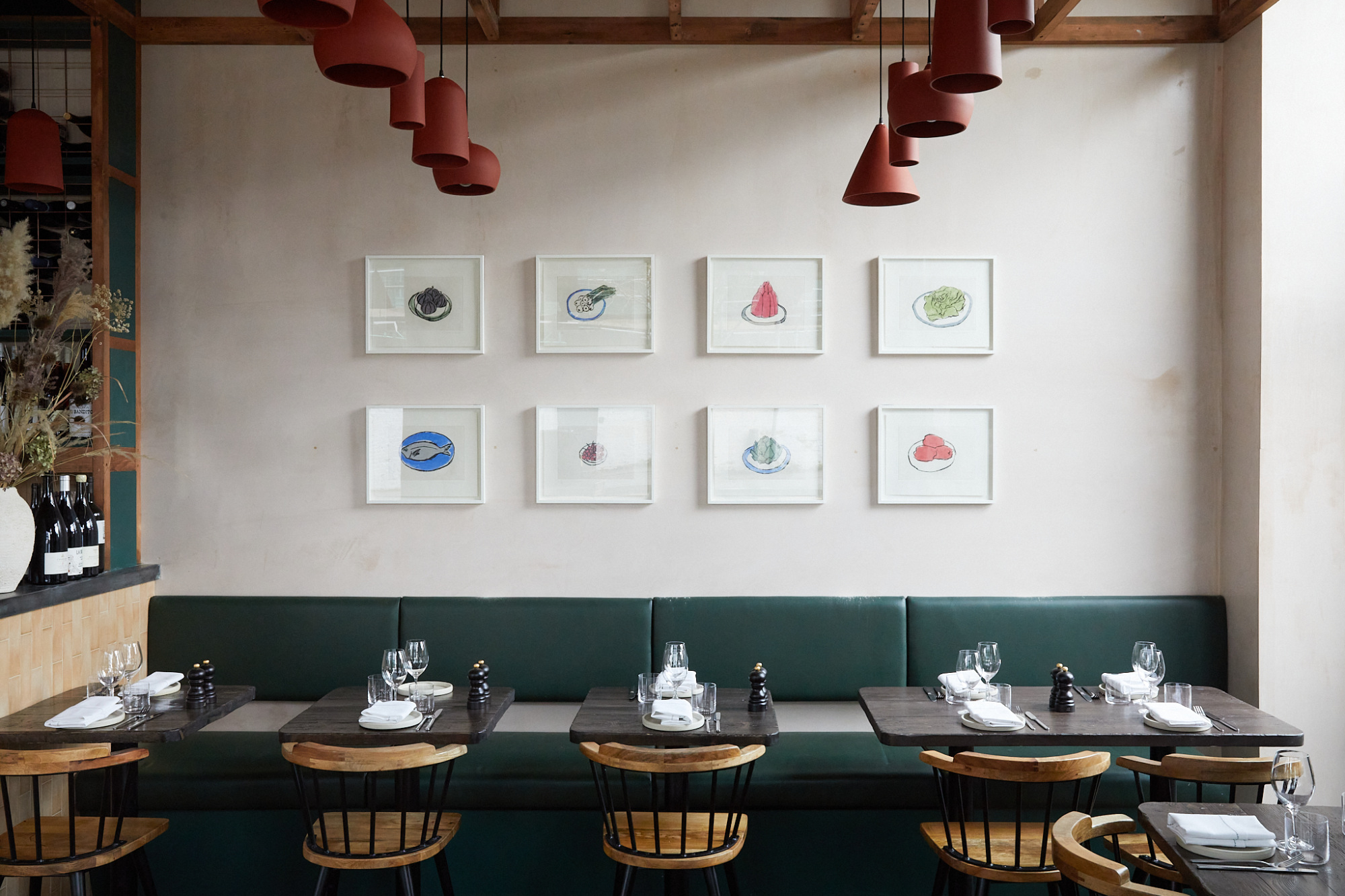
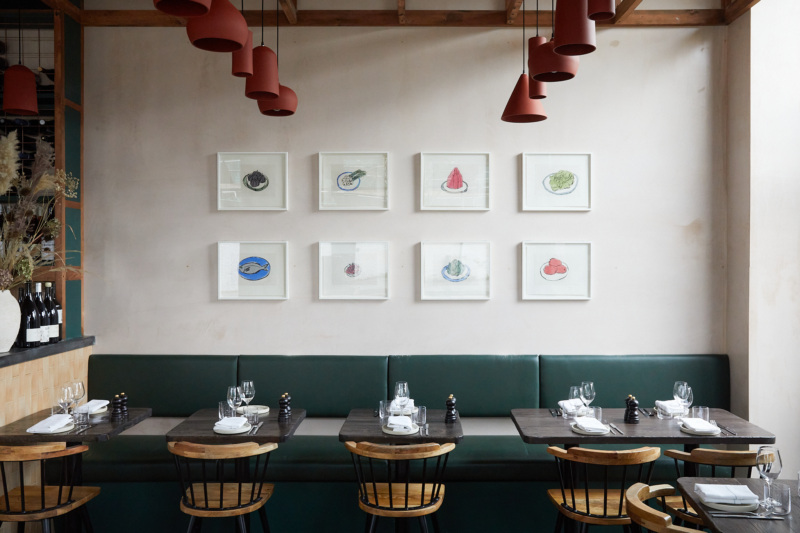
Sune has arrived in one of the world’s great restaurant enclaves.
Spencer and Sims started fantasising about the restaurant they’d open together on their first date. But it was only when Bright, one of their favourite locals, went under last year that they were “shocked into action”. Hackney’s their manor; it’s where they and their four-year-old son call home. “Hackney has got to be one of the best neighbourhoods in the world for restaurants,” says Spencer, citing Brawn (“such a benchmark for us”), Ombra, Café Cecilia, and Elliot’s. They wanted to get involved. “We were ready to be part of a neighbourhood and invest in a neighbourhood and get to know the local community.” They looked at Broadway Market (“the premiums are obscenely huge”), lucking out with the Sune site, once a bike shop, just to the south on Regent’s Canal. Their son will turn eighteen the year the lease is up. “It will be his whole childhood effectively,” says Spencer. They want to be closer to him. Already Leonard greets guests and offers still or sparkling like a pro. “We tell him it’s the family restaurant, not mummy’s and daddy’s,” says Sims. “It’s all of ours.”
Sune yields to the sometimes opposing needs of family and community. For the family’s sake, they will never open on Sunday evenings; for the community, they’ll do Sunday lunch. For the family, they close Tuesdays; for the community, they will open Mondays. “Monday is really important to us because so many other places are closed. It’s also when a lot of the people who work in the industry can go out to eat and drink.”
The wine list is an accumulation of every wine I’ve really loved— Honey Spencer
At Sune, everything is dialled up.
To stand out from the pack, Spencer and Sims have drilled down into what they do differently. The answer is service. No shade to chef Michael Robins but Sune isn’t chef-led; it’s service-led. The owners are there every service. “Our strength as a duo and our strength in general is making people feel really at home and kind of providing this amazing warmth,” says Spencer. They’re passionate about being in service, on the floor, not at a desk. Spencer notes, as diplomatically as possible, that great food is easy to come by in London, great service not so much. “It’s quite hard, I think, to find somewhere people make you feel happy, and comfortable in your own skin, and nourished and restored.”
In all their years of restaurant-going, they’ve been taking copious notes. They look to the restaurants they love: Estela in New York, a neighbourhood restaurant Spencer describes as “just killer”, Ester in Sydney (“again, a really, really beautiful place that delivers something quite surprising” and 10 William Street in Sydney where Spencer worked. They look at what works, what doesn’t work. “Every time that you go to a restaurant that you love you always kind of save a bit of it in your brain and go ‘how can we [use it]?’” says Spencer. Sims did the same with the playlist. For the past ten or fifteen years, every time he heard a track he liked, he saved it. He’s now got 150 hours of music, encompassing hip hop, pure pop, disco, even ABBA. “The volume’s turned up literally,” says Sims, “but even the flavours are dialled up, in the food and the cocktails. What we want to do is kind of turn up the notch with everything.”
Sune falls somewhere on the scale between normal and Noma.
In 2015, Spencer and Sims had every intention of going to Australia; they even had visas. But one night Spencer came home from her shift brimming with excitement about Copenhagen. Sims wasn’t sure. “I said ‘what’s in Copenhagen for us? Obviously, I knew about Noma but I’d never worked in a Michelin starred place before. But I was like, if we’re going to go to Copenhagen I have to get in touch with these guys.” Noma had no vacancies but told Sims to come say hi. anyway. He did so and came out with a trial shift. He came out of his trial shift and said, “I think we need to cancel Australia.” (A happy aside: two weeks later Noma announced Noma Australia so they made it after all.)
Sims was a waiter for two years at Noma 1.0 then Noma Mexico, before returning to the UK. An email from René Redzepi offering him the restaurant manager’s gig at Noma 2.0 saw him racing back. “This is definitely something you don’t say no to.” He loved the job, even the pandemic burger era. “Very surreal.”
Sims gives his front-of-house take on Noma: “It wasn’t stiff or formal, it was like being in a cosy wine bar with all these laid-back people full of swagger and fun. It was a fun style of service but still incredibly intuitive, on point and professional. Noma is often remembered for foraging, fermentation and hyperseasonality, but they were also incredibly innovative in their service style, breaking down boundaries, getting the kitchen team to present dishes. These things are done across the world now.”
In Sims’ mind, Noma is at one end of the spectrum, Cha Cha’s (the café his mum ran in Portsmouth) at the other (“It was a very humble place but her hospitality was amazing.”) Sune falls somewhere in the middle.
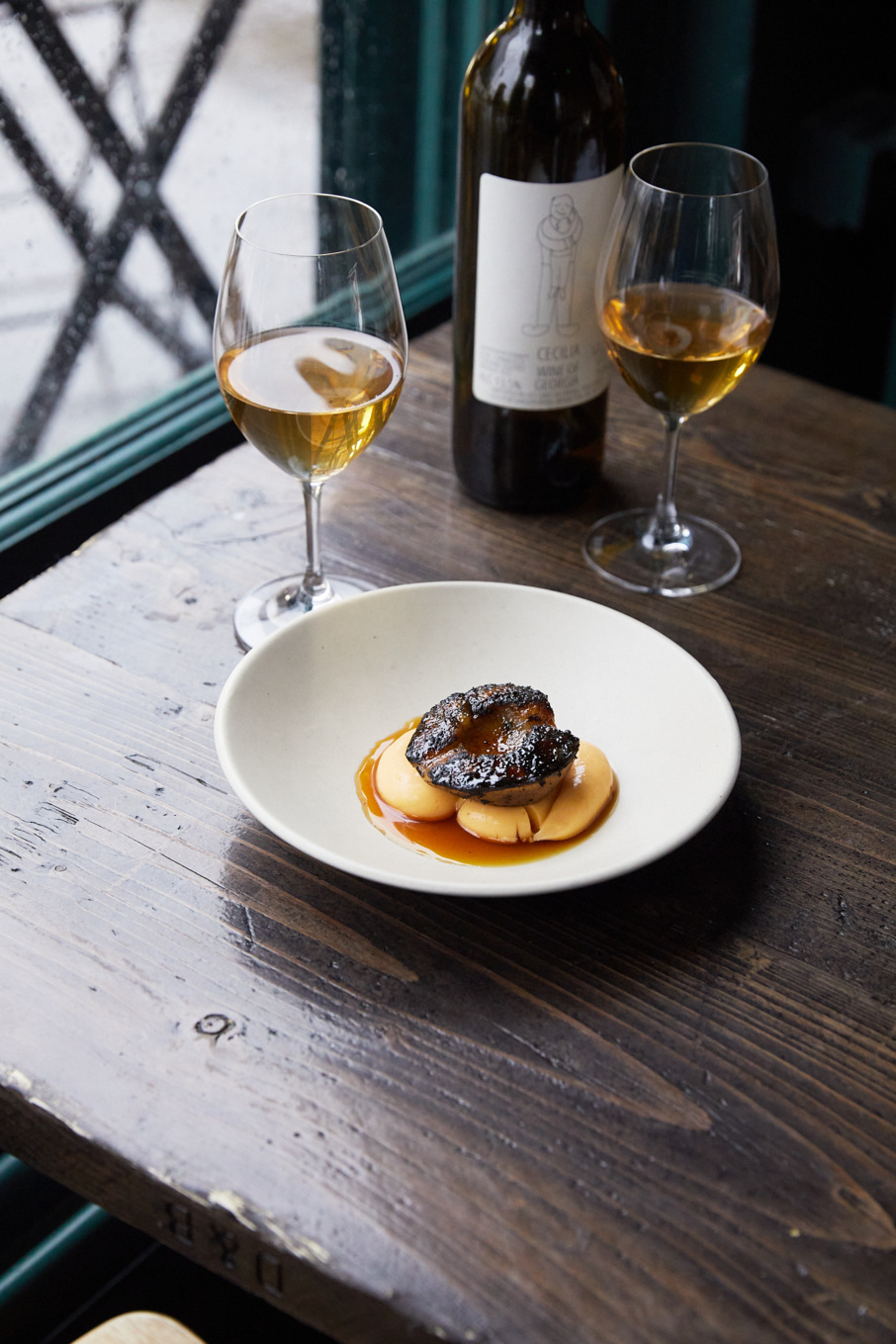
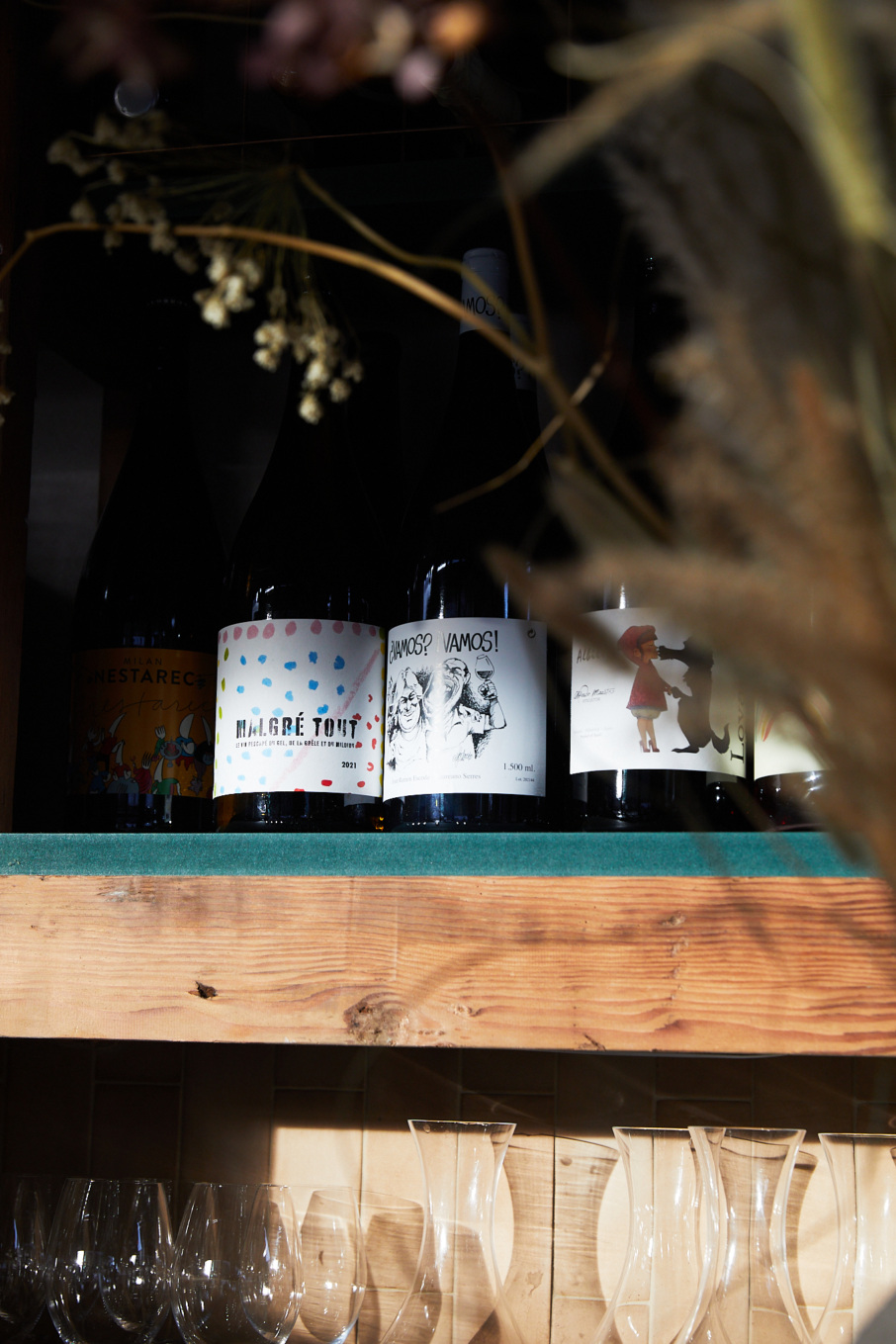
For her own restaurant’s wine list, Spencer feels as free as she’s ever felt.
Chefs opening restaurants is normal; sommeliers opening restaurants less so. Sune’s wine list belongs not just to Spencer; Sims is allowed 20 percent of it. It is “an accumulation of every wine I’ve really loved and we’ve really loved,” she says. The wines are almost exclusively natural. “It was really important for our wines to be exciting and full of life in the way that only natural wines can be, but also really refined and really stable. They’re not going to upset anyone’s mum who wants to try orange wine for the first time and goes “Oh no, I hate this, I feel uncomfortable.” I really can’t risk a situation where we’ve made someone uncomfortable because suddenly they’re drinking a wine that’s so foreign to them.”
What she didn’t want to offer was “another cookie cutter east London wine list.” “It would be such a shame given that we have made such an effort in our careers to travel the world and to see places other than just Burgundy and the Jura.” East London wine lists tend to be eurocentric; however, Sune’s food isn’t. “Mike’s food is so global, it feels very high energy, very New York, very California, very east Asia. It’s really allowed me to be a lot more creative than I ever have been with a wine list. I’ve felt really kind of freed up recently. I took my first trip to California this summer and it was amazing to see what people are doing out there. The flavours are so bright and so bold.” She’s also been getting into Georgian wines and sakes, having qualified as a sake sommelier last year.
The challenge, she says, is finding wines to list for under £40. “We deliberately dipped our margins on house wine as it’s so important for us to have a wine under £30 that’s delicious and isn’t everywhere.” They’ve also dipped margins around the £60-£70 bracket, as that’s where their eastern European and Georgian wines are. “We really want people to try them.” Spencer’s first book “Natural Wines, No Drama” comes out in spring; she knows whereof she speaks.
Sune’s cheese toastie topped with beef came into being over a few beers.
Sims and Spencer have strong ideas about how they want the food to be (‘comforting’ and ‘elevated’ are the words that come up) and were apprehensive about finding a chef who’d relish that. Luckily, they found Michael Robins, previously head chef at Pidgin. The three of them love to talk food. “This relationship has potential to be a really difficult relationship because I have so many thoughts about the food and the menu and how I’d like it,” says Sims. One dish he had on the sample menu he sent Robins is a smoked eel Caesar salad; Robins’ version is now on Sune’s opening menu (“like the most outrageous crispy bacon ever”). There’s also an outrageous, messy, polarising “cheesy oystery toastie with beef tartare” that Robins and Sims dreamed up over a few beers and is already one of the most talked about dishes. And then there’s the pasta, rich with confit egg yolk, but tempered by pickled wild mushrooms: “That’s an angle that we’ve really liked. We’ll give you the comfort and then we’ll lift it up. It’s a good hallmark for Mike’s creativity.”
Hilary Armstrong is a London-based journalist and editor. Follow her on Instagram and Twitter. Follow Resy, too.

